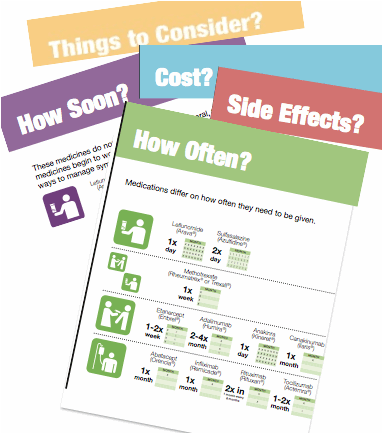Background/Purpose: Medication options for juvenile idiopathic arthritis (JIA) are increasing. Medications differ on a variety of attributes, including mechanisms of action, dosing intervals, modes of administration, safety profiles, and cost. Some parents of children with JIA are left with questions and concerns about medications suggesting a need for improved clinician-parent communication. Decisions like this, with multiple reasonable options that differ in ways that matter to families, are conducive to “Shared Decision Making” (SDM). SDM is a process whereby clinicians share information about the options and patients/parents share information about their goals and preferences. Together, a treatment plan is developed that is the best fit for the individual patient and their family. We conducted a project to develop tools to facilitate SDM within the Pediatric Rheumatology Care and Outcomes Improvement Network (PR-COIN). PR-COIN is a learning network designed to improve outcomes of JIA care using quality improvement (QI) approaches.
Methods: Development of issue cards to facilitate SDM involved multiple steps including qualitative interviews with clinicians and care providers, direct observation of clinical encounters, and an iterative design process involving a graphic designer and a stakeholder panel of clinicians, allied health professionals and parents. We introduced the prototype issue cards for use in clinics using Plan-Do-Study-Act (PDSA) cycles. We elicited feedback to guide card revisions from PR-COIN members via weekly electronic surveys and discussions during monthly webinars and following direct observation of encounters using the cards.
Results: We identified the medication attributes deemed most important to discuss by our stakeholders, including “How Soon” will therapies take effect, “How Often” are they given, “Side Effects”, “Cost”, “How Long” will need to stay on the medication, and “Other Considerations.” We used these attributes to organize the issue cards and symbols to convey key concepts (see Figure). Intended use of the cards involves clinicians showing the cards to patient and parent and asking which card they would like to discuss first. By selecting a card, the family reveals what is important to them. After 18 revisions, PR-COIN stakeholders at 6 sites found the issue cards to be acceptable for regular use.
Conclusion: PR-COIN issue cards are well accepted by clinicians and families within network sites. PDSA cycles continue as we seek to implement the issue cards in routine clinical care to facilitate SDM across the network. Our ultimate goal is to drive improvement in child JIA outcomes by reliably engaging patients/parents in SDM to select a medication that is a good fit.
Disclosure:
E. Morgan DeWitt,
None,
2;
E. A. Lipstein,
None,
2;
K. Staun,
None;
L. Scherer,
None;
J. Taylor,
None;
C. M. Lannon,
None,
2;
W. B. Brinkman,
None,
2.
« Back to 2013 ACR/ARHP Annual Meeting
ACR Meeting Abstracts - https://acrabstracts.org/abstract/development-of-tools-to-facilitate-shared-decision-making-about-medications-for-juvenile-idiopathic-arthritis-a-project-of-the-pediatric-rheumatology-care-and-outcomes-improvement-network/

